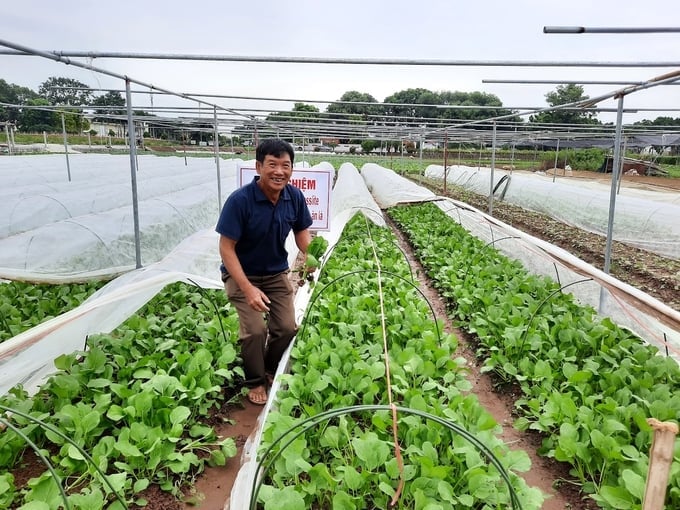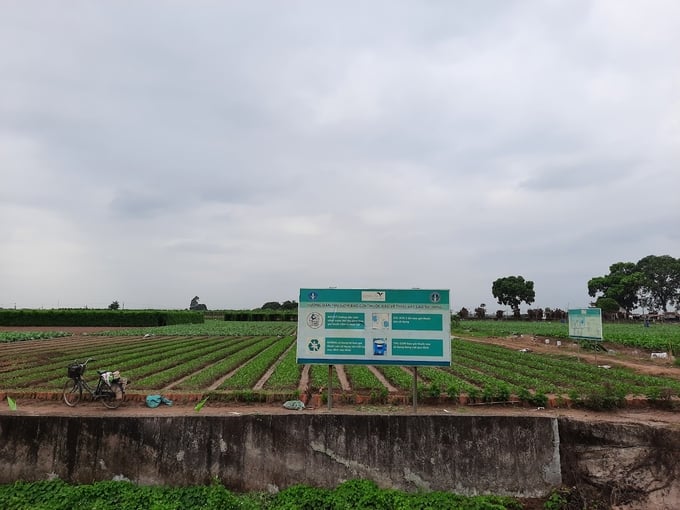November 24, 2025 | 02:57 GMT +7
November 24, 2025 | 02:57 GMT +7
Hotline: 0913.378.918
November 24, 2025 | 02:57 GMT +7
Hotline: 0913.378.918

Hanoi is one of the pioneering regions in implementing Integrated Pest Management (IPHM) for crop health.
With the aim of enhancing the professional development of lecturers in crop health management, the Department of Plant Protection under the Ministry of Agriculture and Rural Development organized the opening ceremony for an advanced training course for TOT-IPM lecturers in Hanoi. Accordingly, participants of the course will be trained to reach a TOT-IPHM level.
This training course aims to educate a team of lecturers on the Action Plan to promote the application of Integrated Pest and Disease Management (IPHM) as per Decision No. 3592/QD-BNN-BVTV issued by the Ministry of Agriculture and Rural Development.
Mr. Nguyen Quy Duong, Deputy Director of the Department of Plant Protection, stated that to date, there are 340 TOT-IPHM lecturers from 48 provinces nationwide, with 42 provinces receiving advanced training to convert from TOT-IPM to TOT-IPHM, totaling 240 lecturers.
The Department of Plant Protection is advising and proposing to the Ministry of Agriculture and Rural Development to coordinate with relevant ministries, sectors, and Provincial People's Committees to comprehensively implement IPHM programs. In addition, stakeholders will integrate IPHM management content into projects with regards to agricultural production and regional raw material areas.
As a pioneering city in implementing IPHM in safe vegetable production, Ms. Luu Thi Hang, Director of Hanoi city's Sub-Department of Crop Production and Plant Protection, stressed that Hanoi has a substantial agricultural production area despite being the capital of the country.
Namely, Hanoi houses a rice production area of over 160,000 hectares, 70% of which are high-quality rice production area, and a vegetable and fruit production area of over 33,000 hectares. Hanoi has also established specialized production areas focusing on the productio of rice, vegetables, and ornamental plants.
High-quality rice and crops are often accompanied by various pests and diseases, so pest management is crucial in the city's production. Notably, the state of pest and disease in Hanoi have shown complex developments in 2023. Consequently, Ms. Hang emphasized that the knowledge from this training course is essential for crop health protection in the immediate future.

A safe vegetable production area in Van Duc commune, Gia Lam district, Hanoi.
With guidance from the Department of Plant Protection in implementing specialized content to promote the implementation of IPHM in crop health protection, Hanoi city's Sub-Department of Crop Production and Plant Protection has advised the local Department of Agriculture and Rural Development on organic farming models and guiding farmers in performing pest control on crops.
Namely, Hanoi city's Department of Agriculture and Rural Development implemented the Safe Vegetable Production and Consumption Project for Hanoi from 2009 to 2015.
The project focused on activities to enhance knowledge, skills in safe vegetable production for farmers, as well as training, retraining, transferring advanced techniques, and communication to meet food safety requirements in vegetable production.
During the implementation process, the department organized nearly 900 training classes for farmers on integrated pest management in vegetables for nearly 27,000 farmers. Eight safe vegetable processing facilities were established in concentrated production areas with a daily capacity of 3 to 7 tons in the communes of Van Duc, Yen My, Duyen Ha, Thanh Da, Tien Le, Chuc Son, Dang Xa, Nam Hong.
The rate of herbal and biological pesticide application in agricultural producton has reached 60%, subsequently reducing the rate of chemical pesticide application by 30%. The cost of using chemical plant protection has decreased by 50%. The rate of vegetable samples exceeding the maximum permissible chemical residue has been limited to only 1% of the number of collected sample.
As a result, the safe vegetable production area in city reached over 5,000 hectares by 2017, including over 200 hectares of VietGAP-compliant vegetable production area and over 50 hectares of organic vegetable production area. Additionally, vegetable yields increased by 18%, reaching nearly 400,000 tons per year and meeting 40% of consumer demand. Annual production value was also increased to 300 to 500 million Vietnamese dong per hectare.
Following the training course, the local Department of Agriculture and Rural Development will continue to upgrade integrated pest management to integrated crop health management to be applied in the safe production of various crops and vegetables in the city.
Mr. Nguyen Manh Phuong, Deputy Director of the Hanoi city's Department of Agriculture and Rural Development, believes that the production area for rice, vegetables, and fruits in Hanoi city will continue to rise by 2030.
Furthermore, Hanoi aims to build a high-quality agricultural sector, thereby ensuring the health of consumers, and providing nutrient-rich food. Training sessions are an opportunity to mobilize intellectual resources to meet these goals.
Translated by Nguyen Hai Long
/2025/11/22/4018-4-213342_747.jpg)
(VAN) The Mekong Delta Agricultural Experts Club has attracted 143 experts and researchers to participate in providing consultancy and contributing initiatives to the development of one million hectares of high-quality rice.

(VAN) Ca Mau’s development of OCOP products opens a path to increasing cooperatives value, helping boost income, expand markets, and affirm collective economy's role.

(VAN) Turning seemingly ordinary coconut shells into unique jewelry and artwork, Nguyen Bang Nhi spreads the value of local culture through her brand, Cocohand.

(VAN) Results from the Sustainable Durian Model Project in Dak Lak have confirmed the critical role of Yara Viet Nam in transferring advanced nutritional solutions to farmers.

(VAN) In Tuyen Quang province, livestock farmers have introduced effective models and innovative practices that significantly strengthen African Swine Fever prevention and control efforts.

(VAN) This is the study conducted by IRRI and Can Tho University on the rice straw value chain in Mekong Delta showing an economic potential of more than 6.6 trillion VND/year.

(VAN) By participating in cooperative economics, many farmers in Tay Ninh have overcome hardship, mastered clean dragon fruit cultivation techniques.